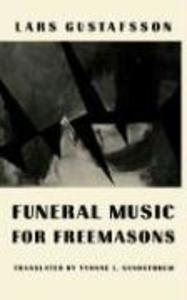
Zustellung: Sa, 11.01. - Do, 16.01.25
Versand in 2 Wochen
VersandkostenfreiBestellen & in Filiale abholen:
Lars Gustafsson's Funeral Music for Freemasons (1983), the Swedish writer's fifth book of fiction to be translated into English, follows the lives of three free spirits of the 1950s, from their aspiring student years in Stockholm to their present realities, so different from their youthful imaginings. Jan Bohman, a brilliant poet become smalltime African merchant--a latterday Rimbaud--is about to be deported from Senegal. Hans ("Hasse" to his friends), an idealistic research physicist, is now a professor at Harvard, leading the protected surburban life of an American academic. Ann-Marie Nö hme, the promising Mozartean soprano in the bonds of whose love both men agonized, has had a failed career in a provincial repertory. How could so much talent have come to so little? Was there something in the Sweden of their youth, and by extension the whole of the industrial West, that prefigured the death of creativity? Or might it have been spent, drained away in love's passion? Then again, perhaps these years never did in fact happen, memory following one time-line, existence another, so that their real lives seem to have gone unlived. With his customary psychological delicacy and philosophical aplomb, Lars Gustafsson has composed a novel in Funeral Music for Freemasons that, like the Mozart Trauermusik the title invokes, sings a moving dirge for an age.
Produktdetails
Erscheinungsdatum
17. Mai 1987
Sprache
englisch
Seitenanzahl
160
Autor/Autorin
Lars Gustafsson
Übersetzung
Yvonne L Sandstroem
Verlag/Hersteller
Produktart
kartoniert
Gewicht
177 g
Größe (L/B/H)
201/132/12 mm
ISBN
9780811210188
Bewertungen
0 Bewertungen
Es wurden noch keine Bewertungen abgegeben. Schreiben Sie die erste Bewertung zu "Funeral Music for Freemasons" und helfen Sie damit anderen bei der Kaufentscheidung.









